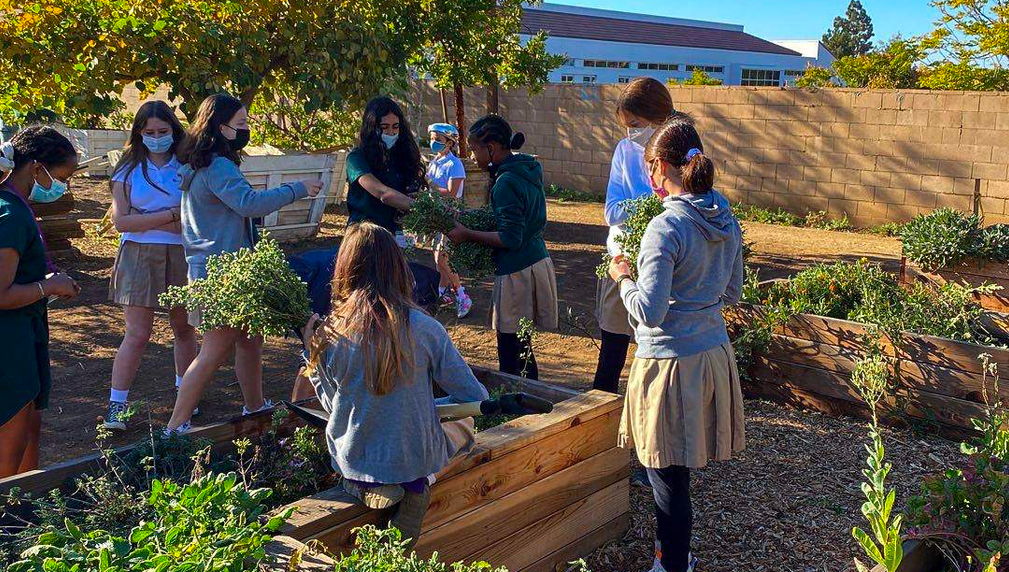Regenerative Edible and Native School Gardens in Los Angeles, California
With the funds from the LA 2050 Grant, 3R Garden Design will expand the capacity and systems at the Student Learning Garden located at the Archer School for Girls in Los Angeles, California. The garden focuses on teaching young women of all backgrounds, ages 11-17, skills like permaculture design, native and indigenous plant care, and creative problem solving to help bring about the climate solutions of tomorrow. The funds will also help us collect rigorous data to refine our process and bring our proven school garden concept to other campuses.

What is the primary issue area that your application will impact?
K-12 STEAM Education
In which areas of Los Angeles will you be directly working?
South LA
West LA
County of Los Angeles
In what stage of innovation is this project, program, or initiative?
Expand existing project, program, or initiative
What is your understanding of the issue that you are seeking to address?
The program began out of a need that was not being addressed effectively; a general lack of hands-on youth education around sustainability, food insecurity, food waste, and environmental justice. Roughly 40% of food is wasted in the US, and schools are a large source of this waste. When we educate students and faculty about how to reduce food waste it has tremendous impacts that reach beyond Archer and out into the surrounding community, comprised of mostly student families. Alongside the issue of food waste is that of climate anxiety. It is no secret that students are facing more mental and emotional stress now than at any other time in history. Climate Anxiety is especially prevalent among today's youth, and providing a garden as a sanctuary for students looking for a respite from the usual school rigors helps with their mental and emotional well-being. At the center of our communities are our children, and a burden so heavy as the fear of a dying planet casts a long shadow.
Describe the project, program, or initiative this grant will support to address the issue.
The program at Archer address the above issues in multiple ways. First, we provide in-depth curriculum around climate as it relates to agriculture, food justice, sustainable practices for growing food, and beneficial native plants. We, in partnership with the Sustainable Sciences department at Archer, maintain a constant focus on improving the girls’ proficiency in all areas of STEAM education. Classes are taught 3-4 days per week in the garden and also provide students and teachers with an “outdoor learning lab” that can be used at any time during school hours. Looking forward, we want to also address financial literacy by guiding the students through a student-led community farm stand. This is done by having the students grow, cultivate, harvest, and then sell the produce to the local community. The grant will help us grow this program to include more students and faculty and extend beyond Archer into other schools. We have also decreased food waste at Archer by composting cafeteria food waste for use in the garden, and we seek to expand this program's capacity to divert as much food waste as possible. Throughout this program the students will gain vital knowledge that will stay with them beyond their time at Archer, and them be more thoughtful and effective leaders on whatever path they choose.
Describe how Los Angeles County will be different if your work is successful.
If our work at Archer is successful, we will have an engaging and scalable model for an inclusive student garden program that puts the power in the hands of the children and teaches them how to think for themselves. Public schools of varying economic levels in LA will have access to a public domain blueprint for the planning, implementing, and ongoing operations of a thriving education garden that serves as a place of learning and a hub for the local community to gather. As the program grows from school to school, greater amounts of food waste will be diverted from landfills as a result of robust local composting programs for which these gardens will serve as central hubs. Then, many more individuals in LA county will have a deeper understanding of our food systems and be better equipped to address the challenges that lie within. This will be the "fruit" of educating the youths of LA, who are eager for change and newly empowered with the knowledge of how to make it happen.
What evidence do you have that this project, program, or initiative is or will be successful, and how will you define and measure success?
3R has closely monitored the implementation and growth of the program since its inception. We have carefully documented all areas of the garden with photographs since installation as well as the seasonal growth, cultivation, and harvesting. Student projects and current lesson topics from partnering teachers and faculty are also shared with 3R on a regular basis. Specifically, we coordinate with the Sustainability and Earth Science departments on campus to create a well-rounded and complimentary curriculum throughout the school year. This thoroughness has helped the program grow, with consistently increasing enrollment as an elective subject. This enthusiasm has expanded to virtually every department on campus including drama, robotics, and art. Students regularly come to the garden during free periods to seek some quiet, observe the insects, or maybe sneak a ripe strawberry. Students often comment on the improvement to their stress levels after spending some time in the garden.
Approximately how many people will be impacted by this project, program, or initiative?
Direct Impact: 600
Indirect Impact: 5,000